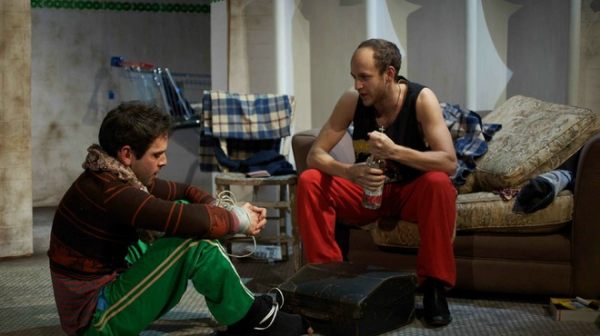Occupied (Theatre503)

When migrant Romanians Alex and Andreea abduct a seemingly average English man, Tom, they tell him they want to be taught to fit in better in their new home country. He is handcuffed and forced to live with them in a dis-used public toilet and initially is far from his comfort zone. While Andreea, who it is implied is under 16, earns money as a prostitute, the friction grows between volatile Alex and subdued Tom as the former seeks the latter's wisdom about English acceptance. He tells Tom that with full shops, a pub on every street and naked women in the newspapers, England is paradise, but Tom is out to change his mind so that he’ll go home. Both are dissatisfied with, and tortured by, their identities, compared to free and naive Andreea. And as the story unfolds, the social dynamic becomes a growingly unhappy one with tensions simmering.
While common Romanian stereotypes are invoked in the HurlyBurly Theatre production, accordion playing, prostitution, heavy drinking and fierce nationalistic pride to name a few, the impressive performances of Mark Conway, as Alex, and Josie Dunn, as Andreea, make these complex characters’ believable. Joe Marsh, playing Tom, captures the jaded side of the 30-something’s character but seems to struggle, as a typical English man would, with the raw emotional scenes. This is a black comedy and there are many laugh out loud moments, mostly at kung-fu lady-killer Alex’s expense, which carry the audience through the two and a quarter hour show. However, the tension is never far from the surface and director Anna Mors manages to create an environment where physical aggression is a looming threat.
There is a lot left unexplained in this play, which can be frustrating but then things in Carla Grauls‘ characters’ lives are not neatly packaged. Still, who is the drunk aggressive woman, who sings Communist songs and eats newspaper, they share their ‘home’ with and what does she symbolise? How did Andreea end up in England (trafficking is strongly hinted at)? Why is being Polish worse than being Hungarian in a Romanian’s eyes?
With the production’s music played live on stage and the only sound effects cars nearby, the staging is aptly minimal. One warning would be for anyone with access issues, getting up into this venue may be an issue as the attached pub is currently closed for development and audience members need to go through a garden entrance and up an outdoor staircase past scaffolding.
For readers of the right-wing press, the occupation of England by Romanian immigrants is old news. Yet, in this production the concept is reclaimed as the stories are plastered on the makeshift home of our immigrant protagonists as a matter of pride – 'we are making little territories in your country, a hostile take-over of your garden sheds, your abandoned houses and your toilets! The occupation has begun’, Alex says grinning madly.
This play explores the issues that Romanians face in Britain and at home, particularly the psychological effects of living in a corrupt and violent nation compared with living in a hostile country where you are made to feel unwelcome. Alex stresses that although people in England may turn a blind eye to Romania’s problems, EU immigration means people should take the time to care as the 'occupation' of Romanian people on British streets means 'it is your problem now'. The audience is left agreeing with the mad Alex and this is testament to how cleverly crafted this story and production are.










